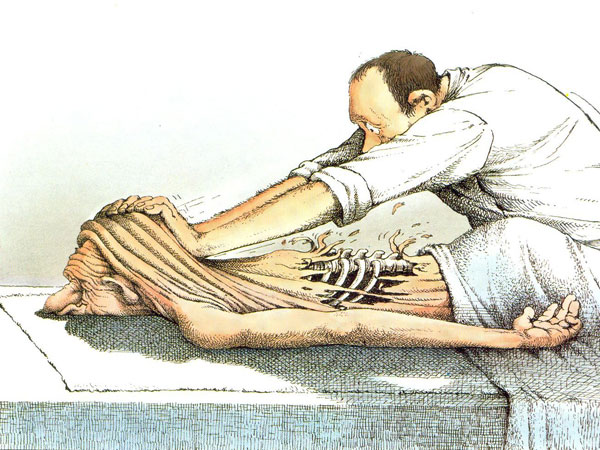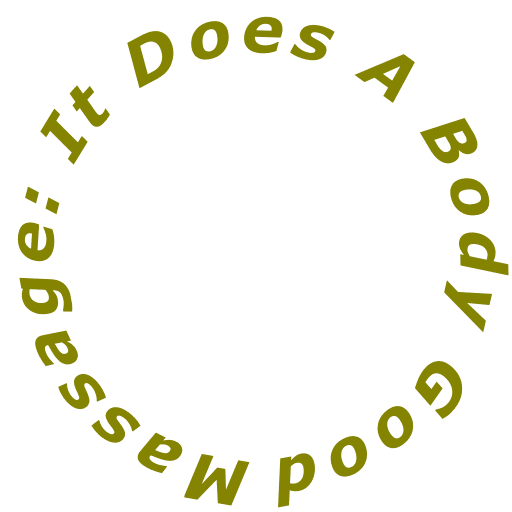Massage Therapy Questions & Answers |
||
Q: Who is an ideal client for massage therapy? A: Nearly everyone can benefit from massage. You don’t have to be a professional athlete to benefit from the difference massage can make in your physical well-being. Daily repetitive activities like sitting, standing, carrying heavy loads, or using the computer will eventually take their toll on your body. Massage is a great way to ease stress, relax sore muscles, and reset your body. Massage can also be helpful in lessening or eliminating pain stemming from a wide range of medical conditions, including low back pain, whiplash, fibromyalgia, sciatica, carpal tunnel syndrome, TMJ pain, migraine headaches, gout, frozen shoulder, and many others. Q: How often should I get a massage? A: Depending on your personal health goals, and where your stress levels are, you might benefit best by receiving weekly sessions to start, and then adjusting frequency down to bi-weekly or monthly sessions to maintain wellness. Regardless of frequency, session consistency is key to getting the maximum benefit from your massage therapy regiment. Q: Why don't you charge the same as other Massage Therapists? Aren't your sessions too long? A: I believe that I'm being paid the same. You're paying for a therapeutic massage session, and expecting the therapist to address your issues, to the best of their ability. Critics say I'm charging too little, or offering too much. I feel that I'm simply giving the client what they've paid for. My goal is to be thorough, and provide the absolute best massage therapy that I can offer. I don't believe that the clock on the wall should ever dictate how much or how little massage therapy my client will receive. Every client's body is different, with unique concerns that often require and deserve the additional time to properly address their needs. Rest assured, I am very capable of providing effective and beneficial massage, within a 60-minute timeframe. Please let me know that you have specific time constraints for the session, and I will gladly make adjustments, to accomodate your request. Q: What should I expect during my first massage? A: Please arrive a few minutes early to your first appointment, as you'll need to fill out a brief confidential health history intake form. If you'd like to print and complete the intake form ahead of time, you can find the form here. Prior to the session, I'll have a short discussion with you, to assess your needs and goals for the session. This is also your chance to ask any questions that you may have. Please note that some conditions, injuries and illnesses are contraindicators for receiving massage. It is extremely important that you fully inform me of your condition, to prevent potential complications. I'll excuse myself from the massage room, giving you privacy to disrobe and position yourself on the massage table. You will be covered by a sheet the entire time you are on the table. Once you're situated, I will re-enter the massage room, to begin your session. You'll receive a custom therapeutic massage, personalized to suit your individual needs, as discussed during the intake process. For example, if you are experiencing back pain, more emphasis might be spent on those muscles, than on your legs. I will monitor the pressure that I am using, as to provide benefit without extreme discomfort. You are encouraged to request more or less pressure, or let me know if you are uncomfortable, at any time during the session. I will immediately adjust to suit your needs. When the massage session is complete, I will leave the room, to give you privacy to gather yourself, and get dressed. Once situated, I will provide you with water, and we will have a brief dicussion about the session, effects of the session, and suggested courses of action for your continued health maintenance. Q: Do you expect me to chat during the massage? A: No. The decision to chat during the session is entirely yours. While stillness and quiet can enhance your relaxation experience during the massage, I fully understand if you wish to chat during the massage, and will do my best to accommodate you. During the session, I typically work in silence, speaking only to give instruction or to ask questions directly related to the session. Q: Do I need to be undressed? Is it okay to leave under garments on? A: No, it's not absolutely necessary for you to be fully undressed, but for maxium results from the therapeutic massage session it is highly recommended. Some strokes used can be performed through clothing, while many of the familiar gliding strokes cannot. Under garments may certainly be left on, although their presence may limit the choice of strokes that can be used in those areas. Undress only to your personal comfort level. If any massage therapist ever tells you that you must take off all clothing, find another therapist. Your body will be professionally draped with a sheet at all times, and only body parts being massage will ever be exposed. Respect for your modesty is always my top priority, and will never be compromised. Q: Do you offer Sensuous Massage, Erotic Massage, Sexual Release, Full Release, Hand Release, Prostate Massage, or Rub & Tug? A: Absolutely not. I offer therapeutic massage, nothing more. If at any time inappropriate language or conduct occurs, the session will be terminated immediately. |
Q: I prefer a female Massage Therapist. Can you recommend a female Massage Therapist in Pittsburgh? A: I highly recommend Sondra Cannon, or Tracey Miraglia. Both are outstanding female massage therapists, who are professional colleagues of mine. Q: Will the massage be painful? A: No. Therapeutic massage should never be painful. It's a misconceived myth that there must be pain involved, for a massage to be effective. If any therapist tells you that massage must hurt to be effective, you should find another massage therapist immediately. Some minor discomfort might be experienced during Trigger Point Therapy or Deep Tissue Massage, but this should be only temporary and will quickly subside with the tissue release. After the massage, some muscle soreness is common, which is usually proportionate to the severity of the muscle tone prior to the massage session. Hypertonic muscles in full contracture will typically yield soreness, whereas muscles of average tone will yield little or no soreness, after a therapeutic massage session. Remember to always let me know if the pressure being used needs to be adjusted, and you can guarantee great results without pain.  Q: I bruise easily, and I take a blood thinner. Can I still be massaged? A: Yes, you can still receive massage therapy. Make certain that you you list any medications on the intake form, and that I am made aware of any health conditions. I can adjust pressures and techniques used, to prevent or minimize bruising. Alternate modalities such as Myofascial Release or Reiki Therapy may be specifically requested, as they do not ulitlize friction or agitation of the tissues, yet they are relaxing and highly effective in relieving pain. Q: How should I expect to feel after my massage? A: Depending on your specific treatment, you should experience a deep level of muscular relaxation, with perhaps some minor muscle soreness. All clients experience an improved sense of well-being, with some feeling relaxed and drowsy, and others feeling refreshed and invigorated. One of the greatest benefits of massage is that it directly stimulates an increase in endorphin levels. Endorphins are the chemicals that run through the body that make you feel good. Increasing endorphin levels has been correlated with a speedier recovery, reduced pain, manages chronic pain, and helps reduce anxiety. Because everyone responds to massage uniquely, it's difficult to know exactly how you will feel after receiving massage, it is certain that you will feel really good. Q: Why is water considered to play such an important role in massage therapy? A: The physical muscle pain we feel is usually contracted tissue, that contains trapped toxins and waste. Therapeutic massage releases these trapped toxins and waste from the tissues of the body. Proper hydration of the body plays an important role in flushing and moving toxins out, and carrying vital nutrients into the tissue. It is important to always drink plenty of water before and especially after every massage session. Q: Should I exercise before or after my massage? A: It is generally believed that massage after exercise helps to promote healing, increase circulation, and optimally decrease pain. Some clients prefer to run or lift weights after receiving Sports Massage, because of the increased flexibility and range of motion. Because everyone is unique, you'll need to discover which massage and exercise regiment works best for you.  |
|